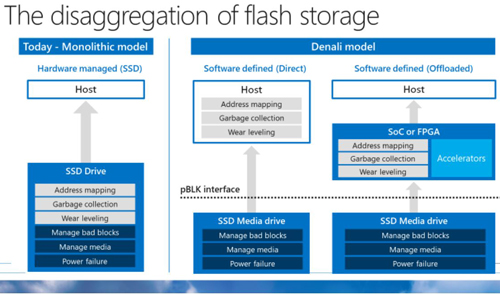News
Microsoft Touts Project Denali for SSDs in Datacenters at Open Compute Event
Microsoft highlighted some of its work with the Open Compute Project this week, including its latest effort with CNEX Labs to simplify solid-state drive (SSD) technology used in datacenters.
The Open Compute Project is an industry coalition that fosters open source hardware solutions for datacenters, and it held its U.S. Summit event this week. Microsoft's new effort as part of the Open Compute Project, called "Project Denali," aims to standardize SSD firmware interfaces through an architectural change to improve flash storage for "cloud-based workloads."
The new "flexible" design of Project Denali is intended to be used for host microcontrollers or field programmable gate arrays (FPGAs) in datacenters, with the aim of reducing costs, improving performance and supporting scalability. With it, hardware companies will be able to build simpler products and support new NAND ("negative AND") flash memory technologies, Microsoft asserted in an announcement.
Microsoft described Project Denali as defining "a model for using software-defined data placement on SSDs to disaggregate older, monolithic storage models." The concept is illustrated in the following diagram, which shows some SSD tasks becoming software defined under the Project Denali approach:
 [Click on image for larger view.] SSD designs for datacenters, showing current approach vs. Project Denali model. (Source: March 20 Microsoft post)
[Click on image for larger view.] SSD designs for datacenters, showing current approach vs. Project Denali model. (Source: March 20 Microsoft post)
Microsoft is currently partnering with CNEX Labs, Broadcom, Intel, LiteOn, Samsung, SK Hynix and Marvell on Project Denali. It plans to contribute the Project Denali open standard at some point to the industry, and it'll be available "broadly later this year," according to another Microsoft announcement that described the technical details.
Project Cerberus Update
Another Open Compute Project backed by Microsoft is Project Cerberus, which aims to improve firmware security protections for motherboards and peripheral I/O devices by detecting unauthorized changes. Microsoft describes it as "a security co-processor that establishes a root of trust in itself for all of the hardware devices on a computing platform." It's designed for all platform types and aims to protect against "malicious insiders with administrative privilege," outside hackers and malware.
Microsoft had introduced Project Cerberus last year. This week, it indicated that it's "on the verge of contributing the hardware implementation to the community for greater collaboration and adoption." Current partners on Project Cerberus include ASpeed, Broadcom, Cavium, Facebook, IBM, Intel, Mellanox, NXP and Qualcomm.
SONiC Update
Microsoft this week noted additional industry support for its Software for Open Networking in the Cloud (SONiC) and Switch Abstraction Interface (SAI) technologies, which add switch flexibility for Linux systems in datacenters. It also revealed that SONiC "is the default switch OS powering Azure and many other parts of the Microsoft Cloud." SONiC is particularly used in Microsoft's artificial intelligence platform, the company explained in an announcement.
Cisco and Innovium are now supporting the technologies, according to the announcement. There are new VLAN trunking contributions from Alibaba, Mellanox and Tencent. LinkedIn, owned by Microsoft, also is a SONiC contributor with its own Project Falco, an effort aimed at building a software-defined switch.
Many more chip and switch builders back SONiC or SAI technologies, as Microsoft had described last year.
Original design manufacturers (ODMs) also support SONiC, and the numbers have grown. Joining the effort are Alpha Networks, Celestica, Delta Networks, Inventec and Quanta Computer. Microsoft indicated that the number of ODMs supporting SONiC doubled "over this past year."
At the Open Compute Project event, Apstra demonstrated its AOS with SONiC solution on Mellanox switches. AOS is an operating system for datacenter networks that automates the configuration and updating processes. In addition, Arista demonstrated management capabilities when using SONiC with the Arista Extensible Operating System for datacenters. Microsoft also indicated that Marvell is using SONiC with an ARM-based switch.
About the Author
Kurt Mackie is senior news producer for 1105 Media's Converge360 group.